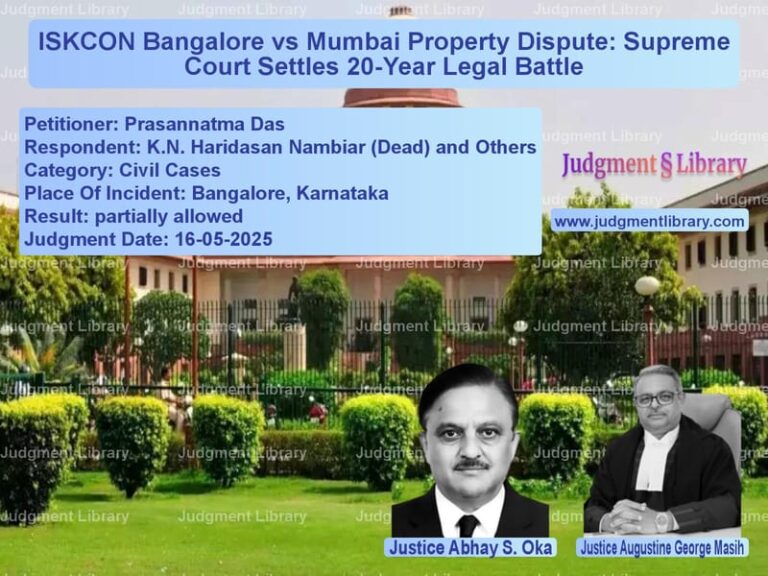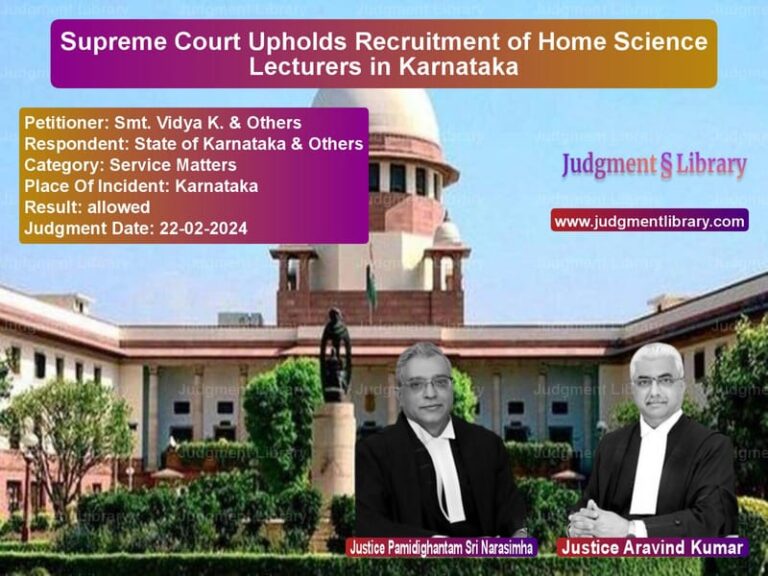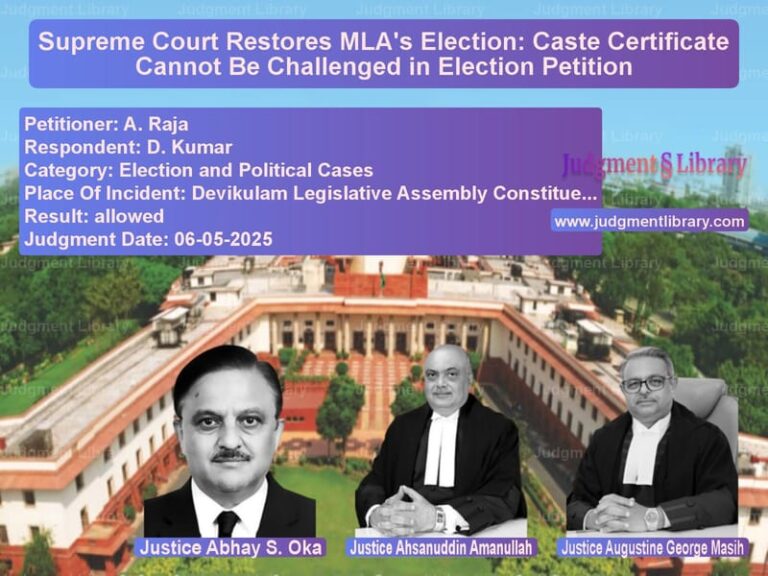EWS Reservation and Constitutional Challenge: Supreme Court’s Decision on the 103rd Amendment
The Supreme Court of India, in its landmark judgment dated August 5, 2020, deliberated on the constitutional validity of The Constitution (One Hundred and Third Amendment) Act, 2019. This amendment introduced economic criteria-based reservations for the Economically Weaker Sections (EWS) in education and public employment.
At the core of this case was the question of whether the amendment violated the basic structure of the Constitution by providing reservations based purely on economic criteria, surpassing the established 50% cap on total reservations. Various petitioners challenged the amendment, arguing that it contravened the principles laid down in the Indra Sawhney judgment, which held that reservations should be primarily based on social and educational backwardness.
Background of the Case
The 103rd Constitutional Amendment Act inserted clauses (6) in Articles 15 and 16 of the Indian Constitution, allowing for a 10% reservation for EWS candidates in educational institutions and government jobs, over and above the existing reservations for SC, ST, and OBC categories. This led to legal challenges from various individuals and organizations, who contended that:
- Economic criteria alone cannot be a basis for reservation.
- The amendment violated the 50% cap on reservations established in previous Supreme Court rulings.
- Including EWS reservations in private educational institutions, both aided and unaided, infringed upon their rights under Article 19(1)(g).
Petitioners’ Arguments
The petitioners, led by the organization Janhit Abhiyan, raised the following objections:
- The amendment altered the fundamental structure of the Constitution, as reservations have historically been provided to socially and educationally backward classes, not on economic grounds alone.
- The provision for 10% reservation violated the 50% ceiling limit set in Indra Sawhney & Ors. vs. Union of India & Ors. (1992).
- The inclusion of private unaided institutions under the ambit of reservations encroached upon their fundamental rights under Article 19(1)(g), which guarantees the freedom to practice any profession or business.
- The amendment discriminated against SC, ST, and OBC candidates, as it provided additional reservations to EWS candidates while keeping them excluded from this new category.
Respondent’s Arguments (Union of India)
The Union of India defended the amendment, stating that:
- The amendment aimed to provide equal opportunities to economically weaker individuals who did not qualify for existing reservations.
- Unlike reservations based on social and educational backwardness, EWS reservation was an affirmative action measure aimed at reducing economic disparity.
- The 50% cap on reservations was not an absolute rule and could be relaxed under special circumstances.
- As per Article 46, the State has a constitutional obligation to promote the welfare of weaker sections, including the economically disadvantaged.
- The amendment did not alter the basic structure of the Constitution, as it merely provided an additional category of affirmative action without disturbing the existing framework.
Supreme Court’s Observations
The Supreme Court analyzed the arguments in light of constitutional provisions and precedent cases, making the following key observations:
- The basic structure doctrine does not prohibit the legislature from introducing new forms of affirmative action, provided they do not distort the fundamental framework of the Constitution.
- Article 15(6) and Article 16(6) were enabling provisions, allowing the State to make special provisions for EWS candidates without affecting existing reservations.
- The 50% ceiling limit on reservations, as established in Indra Sawhney, was not a rigid rule but a guiding principle that could be exceeded under extraordinary circumstances.
- The inclusion of private educational institutions within the ambit of EWS reservations was a valid exercise of the State’s regulatory powers under Article 19(6).
Final Verdict
After extensive deliberation, the Supreme Court ruled in favor of the amendment, holding that:
- The 103rd Amendment does not violate the basic structure of the Constitution.
- Economic criteria can be a valid basis for affirmative action, distinct from social and educational backwardness.
- The 10% EWS reservation is constitutionally permissible, even if it breaches the 50% cap.
- Private institutions can be required to implement EWS reservations without violating their fundamental rights.
Impact of the Judgment
This ruling has significant implications for India’s reservation policy:
- It marks the first time that reservations have been extended purely on economic grounds.
- It sets a precedent for exceeding the 50% reservation cap under special circumstances.
- It upholds the State’s power to enforce affirmative action measures in private institutions.
- It opens avenues for future policy changes that might extend economic reservations to other areas.
By affirming the constitutionality of the EWS reservation, the Supreme Court has reinforced the principle that economic disadvantage can be a legitimate ground for affirmative action, ensuring a more inclusive approach to social justice.
Petitioner Name: Janhit Abhiyan.Respondent Name: Union of India & Others.Judgment By: Justice S. A. Bobde, Justice R. Subhash Reddy, Justice B. R. Gavai.Place Of Incident: India.Judgment Date: 05-08-2020.
Don’t miss out on the full details! Download the complete judgment in PDF format below and gain valuable insights instantly!
Download Judgment: Janhit Abhiyan vs Union of India & Oth Supreme Court of India Judgment Dated 05-08-2020.pdf
Direct Downlaod Judgment: Direct downlaod this Judgment
See all petitions in Fundamental Rights
See all petitions in Constitution Interpretation
See all petitions in Legislative Powers
See all petitions in Public Interest Litigation
See all petitions in Judgment by S. A. Bobde
See all petitions in Judgment by R. Subhash Reddy
See all petitions in Judgment by B R Gavai
See all petitions in dismissed
See all petitions in supreme court of India judgments August 2020
See all petitions in 2020 judgments
See all posts in Constitutional Cases Category
See all allowed petitions in Constitutional Cases Category
See all Dismissed petitions in Constitutional Cases Category
See all partially allowed petitions in Constitutional Cases Category







